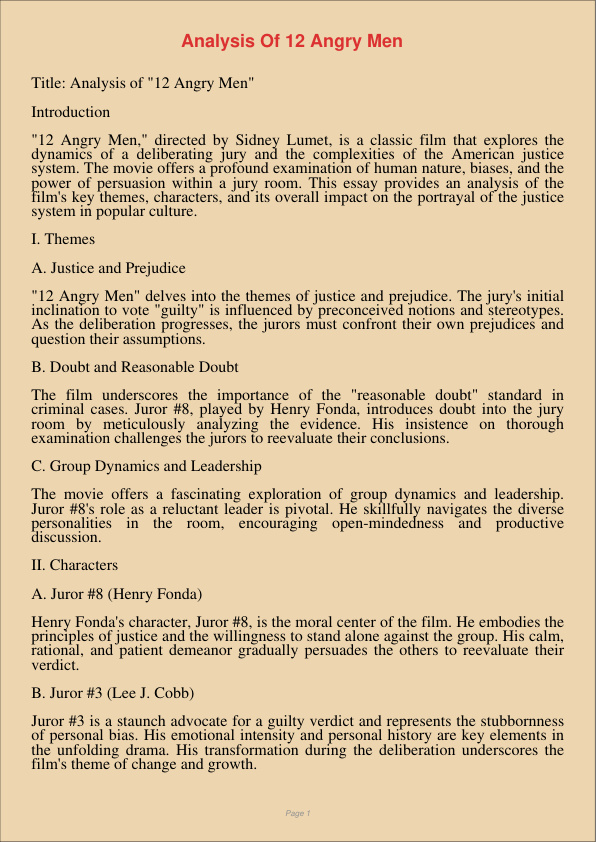Analysis Of 12 Angry Men
Jan 8, 2024
12 angry men
analysis
Literature
Health Sciences & Medicine

Title: Analysis of “12 Angry Men”
Introduction
“12 Angry Men,” directed by Sidney Lumet, is a classic film that explores the dynamics of a deliberating jury and the complexities of the American justice system. The movie offers a profound examination of human nature, biases, and the power of persuasion within a jury room. This essay provides an analysis of the film’s key themes, characters, and its overall impact on the portrayal of the justice system in popular culture.
I. Themes
A. Justice and Prejudice
“12 Angry Men” delves into the themes of justice and prejudice. The jury’s initial inclination to vote “guilty” is influenced by preconceived notions and stereotypes. As the deliberation progresses, the jurors must confront their own prejudices and question their assumptions.
B. Doubt and Reasonable Doubt
The film underscores the importance of the “reasonable doubt” standard in criminal cases. Juror #8, played by Henry Fonda, introduces doubt into the jury room by meticulously analyzing the evidence. His insistence on thorough examination challenges the jurors to reevaluate their conclusions.
C. Group Dynamics and Leadership
The movie offers a fascinating exploration of group dynamics and leadership. Juror #8’s role as a reluctant leader is pivotal. He skillfully navigates the diverse personalities in the room, encouraging open-mindedness and productive discussion.
II. Characters
A. Juror #8 (Henry Fonda)
Henry Fonda’s character, Juror #8, is the moral center of the film. He embodies the principles of justice and the willingness to stand alone against the group. His calm, rational, and patient demeanor gradually persuades the others to reevaluate their verdict.
B. Juror #3 (Lee J. Cobb)
Juror #3 is a staunch advocate for a guilty verdict and represents the stubbornness of personal bias. His emotional intensity and personal history are key elements in the unfolding drama. His transformation during the deliberation underscores the film’s theme of change and growth.
C. Juror #10 (Ed Begley)
Juror #10’s overt racism and prejudice highlight the negative aspects of groupthink and the dangers of stereotyping. His character serves as a stark reminder of the societal biases that can infiltrate the justice system.
III. Impact on Popular Culture
“12 Angry Men” has left an indelible mark on popular culture and has had a significant impact on the portrayal of the justice system in films and television. Some key points of influence include:
Exploration of Justice: The film inspired numerous legal dramas and courtroom procedurals that explore the complexities of the justice system.
Character Development: The nuanced character development in the film set a standard for ensemble casts and the exploration of moral and ethical dilemmas.
Power of Persuasion: “12 Angry Men” highlights the persuasive power of individuals who are willing to stand against the tide of public opinion. This theme has been replicated in various forms of media.
Critique of Bias: The film continues to be referenced in discussions about bias, racial prejudice, and the need for a fair and impartial justice system.
Conclusion
“12 Angry Men” remains a timeless classic that resonates with audiences due to its thought-provoking themes, rich character development, and its critical examination of the American justice system. It has set a standard for legal dramas and continues to be a source of inspiration for filmmakers and storytellers interested in exploring the nuances of justice, prejudice, and the power of persuasion within the context of a jury room.